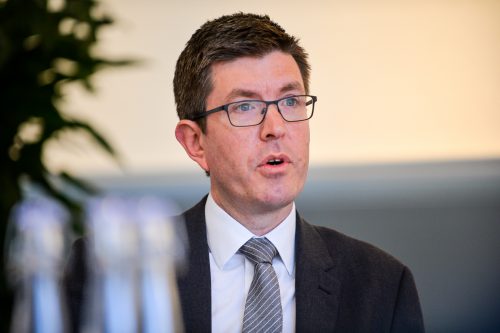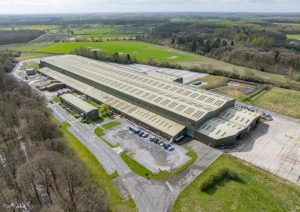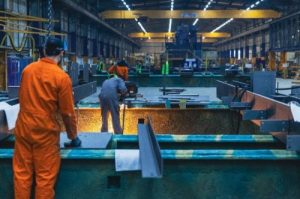Plugging the skills gap in manufacturing

Several Yorkshire manufacturing firms have been impacted by a clear skills gap in their sector and the leaders of those firms feel there are many ways to address this so that the next generation have ambitions to work in the sector and progress their careers in the industry.
Speaking at TheBusinessDesk.com’s What Yorkshire Is Made Of roundtable, sponsored by Grant Thornton and Progeny Corporate Law, Chris Seymour, managing director at William Cook, said there had been a
When he joined William Cook two years ago a large proportion of the shop floor workforce were in their 50s and over. He and his team have since focused on addressing the issue.
He said: “There is that real gap of people in their 30s and 40s now who weren’t brought through the ranks contributing to the sector.”
Seymour said that the next generation of manufacturers, who are now in their 20s, needed to be at the forefront of innovation and across the industry there was more focus on getting younger people in to be involved with innovations. He added: “And it’s more than lip service. We get good trainees and apprenticeships coming through.”
Simon Pollard, of head of production at York-headquartered Portakabin, said: “Addressing the skills gap is a management expectation piece. In the two years I have been at Portakabin, I have looked at our apprenticeship programme and re-packaged it.
“We were offering people a vision of the future that wasn’t what we wanted. What we want is manufacturing apprenticeships, so that when you qualify you are on the shop floor; you are going to be on some tools. You are going to have a supervisor, you are going to have a foreman and he is going to work you. Because that’s how manufacturing works – it’s physical, you need to be doing something. But the expectation of 16/17/18/19/20 year olds is that there is a robot that could do that.
“It’s great having ambition but we now have a clear line of sight from when you start as an apprenticeship, to my job, for instance. You might not want to get there but you should be able to see the pathway through. But you have got to do your time and see where you fit.”
Pollard said that teenagers didn’t want to “get their hands dirty” and would often choose computers over a practical career path because “it is not what is being sold as a bright future.”

Tracey Dawson
Tracey Dawson, managing director of electronic firm Daletech and chair of the Leeds Manufacturing Alliance, said the alliance would be organising a manufacturing festival to get younger generations interested. The likes of the UTC in Leeds and the AMRC were helping to address the gap, she said.
Dawson added: “We [the industry] have a skills gap. We need these young people coming in to futureproof the industry. Daletech has an apprenticeship programme which is focused on mentoring, using as much innovation as possible – What’s App and social for example are included in that. It takes a lot of effort and investment but I think that’s the only way we move forward.”
Pollard said that the older generations needed support around mentoring the younger generations too, in order to pass their skills and knowledge on. “It’s not just about having apprenticeships, it’s about looking at who is mentoring them and making sure bad habits aren’t passed on,” said Pollard.
Nigel Meredith, managing director of Dual Seal Glass in Huddersfield, said: “When you start a business, for the first eight or 10 years, the be all and end all is making a profit.
“We have tended to find that, once they [younger recruits] get past a certain age you improve reliability. You need them to turn up to work in the first place to get anywhere.
“To be able to teach them, you need them to be there regularly. In the early years of running a business, you do miss out on the training because you are so focused on that the company gets toe a certain size – you

Nigel Meredith
can leave it behind a bit.”
Meredith said that was a “massive shortage” of skills in the construction industry and that he was worried about what Brexit would do to the workforce availability from European workers who are employed in the sector. He said that the glass industry did not even have its own apprenticeships, but added that the firm has put forward people to complete NVQs. However, a body is currently setting up apprenticeships, which Dual Seal Glass – as a national leader in the glass manufacturing sector – has also started to shape.
Meredith added: “Strangely, we had our better years through the recession. We got workforce up to 20 foreign workers at the time, now we are down to about 2 now. Without those people at that time, we would have struggled to grow – without their enthusiasm. We are missing that side.
“It’s going to be a challenge. We are a national glass company – the most automated in the country. There is still 20% that needs to be done manually. It’s getting people who want to do that. They don’t see glass/construction sexy and we have to push back to make it sound that way.”
Gordon Macrae, of Gripple, said that attracting and retaining talent was “about being differentiators” and admitted he yawns at the term skills shortages. Instead, he wants to see practical solutions to solve the issue. Gripple has recently invested £1m in a learning and development centre, and also runs a programme underpinning the firm’s values called ‘Gripple spirit’ to drive everything in the business.
“The challenge
is to be consistent and to be fair. If you cut back the people area, it’s always about being fair and truthful. That’s the biggest challenge anybody has in life has. If you want to create a successful, long-term business, that something we have to aspire to,” added Macrae.
Mark Overfield, of Grant Thornton, said there could be a perception that manufacturing was “a bit behind” in terms of the culture and learning that was important to the younger generations.
Seymour added: “If you are not going to change the culture of your business, then don’t try and recruit a millennial. We have had people who haven’t fitted our culture. I will interview people, not for technical skills, but because I want to know what kind of people they are.”
He added that coming up with a new vision and mission to address culture “just would not work” in his business.
Succession planning in the sector and minimising risk
Mark Overfield, of Grant Thornton, said: “Most businesses have succession planning at the heart of what they are doing. Looking at how to build value and what an exit may look like – essentially it’s about making a business more valuable.
“Once upon a time, people would focus on it three years before retirement. Now people look at it a lot more over the life of a business. You almost have to do that over the last decade. There are times when the going might be good when looking for an exit and other times it will be more difficult; it is about positioning a business.
“Anybody will tell you there is loads of money, loads of different money and there is lots of transactions going on. But if you scratch the surface, there will be very little activity in certain sectors but loads of activity around assets seen as good assets.
“It’s about understanding what would make you a good asset. Often it’s about taking away the uncertainties. Minimising risk is important.”

Meredith added: “When he left the business, I set about getting a good team and buying into everybody. But they were all 50 somethings and two have retired in the last three years.
“Plus, the construction industry – with Carillion and a worry about others – it has been extremely challenging in three/fours years to replace those people. I have just about got there, I have had some good people come on board.”
Talking of his future plans, he added: “It’s in abeyance but I am very upbeat – everybody looks up to us in the glass sector – and I am going to take the company forward.”
Overfield said succession planning was difficult in a family business because people want a different things now and being a business owner “doesn’t mean the same thing anymore.”
Seymour, of William Cook, said the firm’s chairman brought the business back into the family 40 years ago and his son is coming back into the business this year. Seymour added: “He will want to do modern way of doing things, no doubt very different to his father’s approach.
“But I can’t move the direction of the firm on my own.”
Gordon Macrae said that Gripple had introduced a new initiative to help with future-proofing, in that every board level appointment by 2021 has to come through the business, which makes the firm focused on

Gordon Macrae
getting the right people and developing them.
“What that addresses is the aspirations of the millennials. There is a career path and it’s open to them,” he concluded.
TheBusinessDesk.com’s What Yorkshire Is Made Of coverage, sponsored by Grant Thornton and Progeny Corporate Law, will be published every day this week and content available on the dedicated Special Report page.










